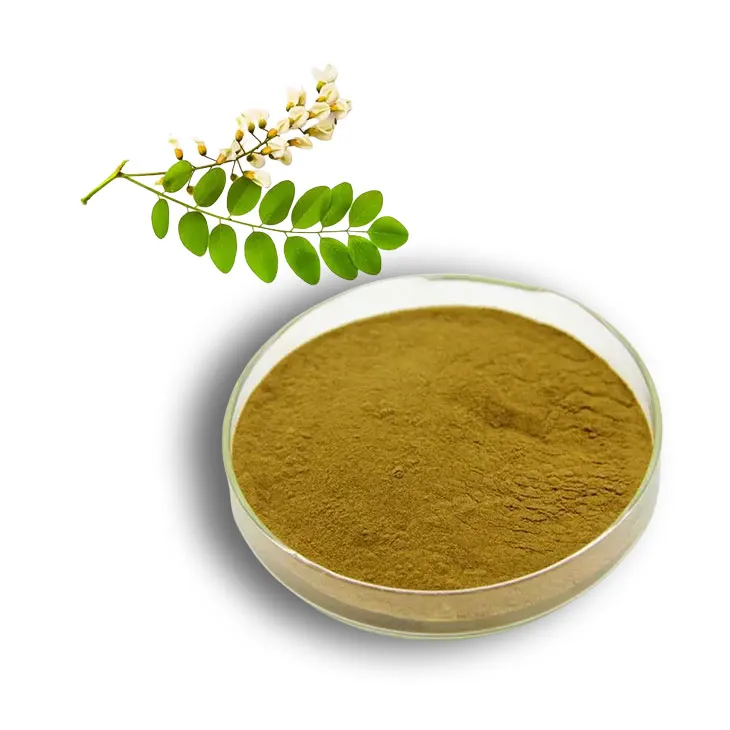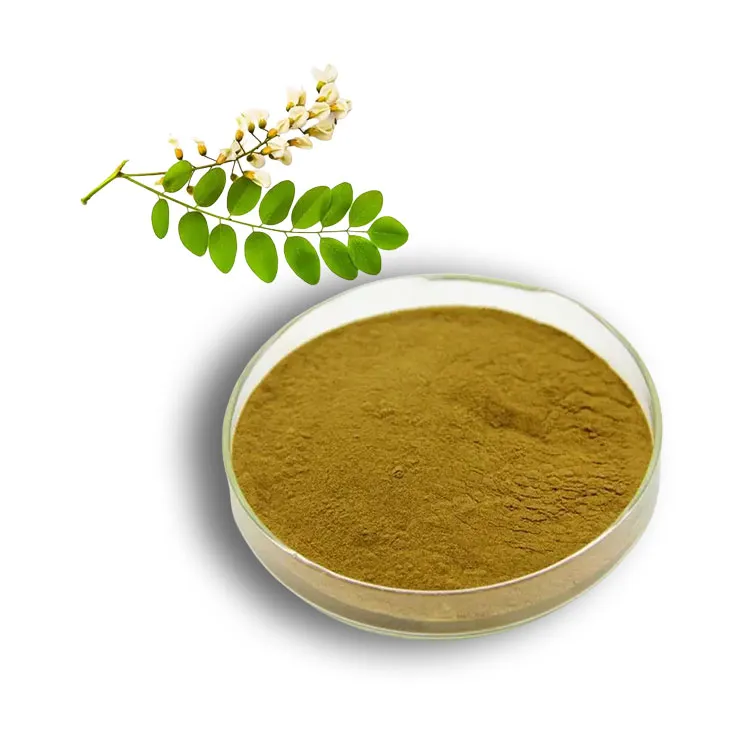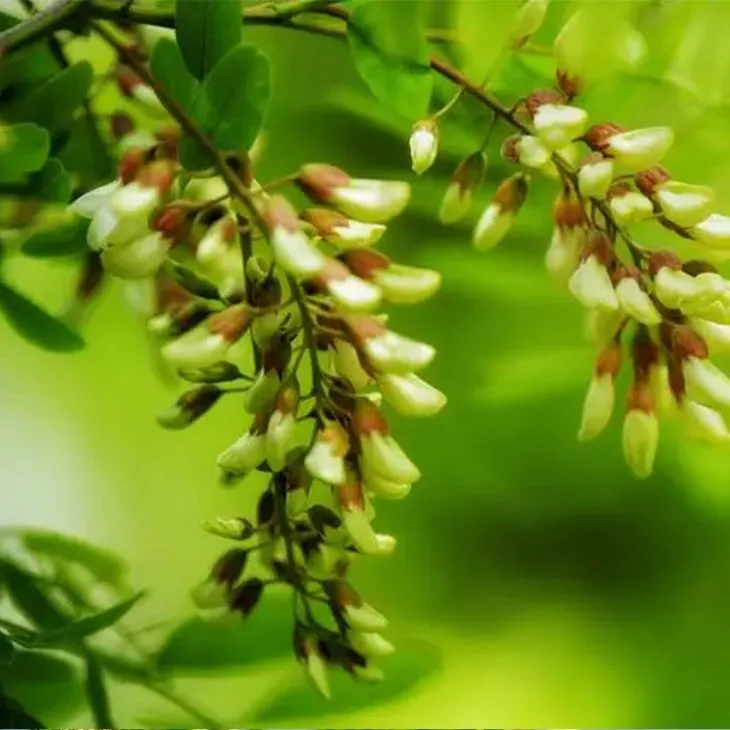- 0086-571-85302990
- sales@greenskybio.com
Sophora japonica flower extract can reduce high blood pressure.
2024-11-14

1. Introduction
Hypertension, or high blood pressure, is a prevalent health issue that affects a significant portion of the global population. It is a major risk factor for various cardiovascular diseases, including heart attacks, strokes, and heart failure. Traditional treatment methods often involve the use of synthetic drugs, which may have side effects. The discovery that the Sophora japonica flower extract may have the potential to reduce high blood pressure has opened up new avenues in the search for natural alternatives for hypertension management.

2. Components of Sophora Japonica Flower Extract
The Sophora japonica flower contains several bioactive compounds that may be responsible for its blood - pressure - reducing effects.
2.1 Flavonoids
Flavonoids are a large class of polyphenolic compounds found in many plants. In Sophora japonica, flavonoids such as rutin and Quercetin are present in significant amounts. These flavonoids have antioxidant properties and can scavenge free radicals in the body. They may also play a role in reducing blood pressure by influencing the endothelial function. Endothelial cells line the blood vessels and play a crucial role in regulating blood vessel tone. Flavonoids can enhance the production of nitric oxide (NO) in endothelial cells. Nitric oxide is a vasodilator, meaning it relaxes the smooth muscle cells in the blood vessel walls, leading to an increase in the diameter of blood vessels and a subsequent decrease in blood pressure.
2.2 Alkaloids
Alkaloids are another group of important compounds in the Sophora japonica flower extract. Some alkaloids have been shown to have biological activities related to the cardiovascular system. For example, they may interact with receptors in the heart or blood vessels, modulating the sympathetic nervous system's activity. The sympathetic nervous system is involved in regulating blood pressure, and excessive activation can lead to increased blood pressure. By modulating this system, alkaloids in the Sophora japonica flower extract may help in reducing hypertension.

3. Possible Mechanisms of Action
The Sophora japonica flower extract may reduce high blood pressure through multiple mechanisms.
3.1 Vasodilation
As mentioned earlier, the flavonoids in the extract can enhance nitric oxide production in endothelial cells. Nitric oxide - mediated vasodilation is a key mechanism in blood pressure regulation. When nitric oxide is released, it diffuses into the smooth muscle cells of the blood vessel walls and activates guanylate cyclase. This enzyme catalyzes the conversion of guanosine triphosphate (GTP) to cyclic guanosine monophosphate (cGMP). cGMP then causes a decrease in intracellular calcium levels in the smooth muscle cells. Calcium is necessary for muscle contraction, so a decrease in calcium levels leads to relaxation of the smooth muscle cells and dilation of the blood vessels. This dilation reduces the resistance to blood flow, thereby lowering blood pressure.
3.2 Hormonal Regulation
The extract may also influence hormonal balance related to blood pressure. For instance, it could affect the renin - angiotensin - aldosterone system (RAAS). The RAAS is a complex hormonal cascade that plays a central role in blood pressure regulation. Renin is an enzyme released by the kidneys in response to low blood pressure or low sodium levels. Renin cleaves angiotensinogen to form angiotensin I, which is then converted to angiotensin II by angiotensin - converting enzyme (ACE). Angiotensin II is a potent vasoconstrictor and also stimulates the release of aldosterone from the adrenal glands. Aldosterone promotes sodium and water retention in the kidneys, increasing blood volume and ultimately blood pressure. Some components in the Sophora japonica flower extract may inhibit the activity of ACE or modulate the RAAS in other ways, thus reducing the levels of angiotensin II and aldosterone and helping to lower blood pressure.
3.3 Anti - inflammatory Effects
Chronic inflammation has been associated with hypertension. The bioactive compounds in the Sophora japonica flower extract, such as flavonoids, have anti - inflammatory properties. They can inhibit the production of inflammatory cytokines and mediators. Inflammatory cytokines can cause endothelial dysfunction and promote the activation of the sympathetic nervous system and the RAAS. By reducing inflammation, the extract may improve endothelial function, modulate the sympathetic nervous system, and regulate the RAAS, all of which contribute to the reduction of blood pressure.

4. Research Studies on Sophora Japonica Flower Extract and Hypertension
Several research studies have been conducted to investigate the effects of Sophora japonica flower extract on hypertension.
4.1 In vitro Studies
- In vitro studies have focused on examining the direct effects of the extract on isolated blood vessels or cells. For example, one study isolated aortic rings from rats and exposed them to different concentrations of Sophora japonica flower extract. The results showed that the extract caused relaxation of the aortic rings in a concentration - dependent manner. This relaxation was associated with an increase in nitric oxide production, suggesting that the extract may have vasodilatory effects at the cellular level.
- Another in vitro study investigated the effects of the extract on endothelial cells. The researchers found that the extract could upregulate the expression of genes related to nitric oxide synthase, the enzyme responsible for nitric oxide production. This finding further supports the role of the extract in enhancing nitric oxide - mediated vasodilation.
4.2 In vivo Studies
- In vivo animal studies have provided more comprehensive evidence of the extract's potential in reducing hypertension. In a study using spontaneously hypertensive rats (SHRs), the rats were divided into two groups: a treatment group that received Sophora japonica flower extract and a control group. After a certain period of treatment, the blood pressure of the rats in the treatment group was significantly lower than that of the control group. Further analysis showed that the extract-treated rats had improved endothelial function, reduced levels of inflammatory markers, and a more balanced hormonal profile related to blood pressure regulation.
- Some in vivo studies have also explored the long - term effects of the extract. For example, a study followed SHRs for a longer duration and found that continuous treatment with the Sophora japonica flower extract not only maintained lower blood pressure levels but also reduced the development of target organ damage, such as cardiac hypertrophy and renal dysfunction. This indicates that the extract may have beneficial effects on protecting the heart and kidneys from the long - term consequences of hypertension.
4.3 Human Studies
- Although human studies are relatively limited compared to animal studies, some initial investigations have been carried out. A small - scale clinical trial involved patients with mild to moderate hypertension. The patients were given Sophora japonica flower extract for a certain period, and their blood pressure was monitored. The results showed that a significant proportion of the patients experienced a reduction in blood pressure, with no major adverse effects reported. However, more large - scale, well - designed human studies are needed to confirm these findings and determine the optimal dosage and treatment duration.
5. Limitations and Future Directions
While the potential of Sophora japonica flower extract in reducing hypertension is promising, there are still some limitations to consider.
5.1 Standardization of the Extract
The composition of the Sophora japonica flower extract may vary depending on factors such as the extraction method, plant source, and growth conditions. This lack of standardization can make it difficult to compare the results of different studies and ensure consistent therapeutic effects. Future research should focus on developing standardized extraction methods to ensure the quality and efficacy of the extract.
5.2 Mechanism Elucidation
Although several possible mechanisms have been proposed, the exact mechanisms by which the extract reduces blood pressure are not fully understood. Further in - depth studies are needed to clarify the complex interactions between the bioactive compounds in the extract and the physiological systems involved in blood pressure regulation. This will help in better understanding the therapeutic potential of the extract and may also lead to the development of more targeted treatment strategies.
5.3 Safety and Side Effects
While the initial human studies suggest that the Sophora japonica flower extract has a relatively good safety profile, more comprehensive safety evaluations are required. Long - term use of the extract may have potential side effects that are not yet known. Additionally, interactions with other medications need to be investigated, especially for patients who are already taking antihypertensive drugs or other medications.
5.4 Clinical Efficacy
As mentioned earlier, more large - scale human clinical trials are needed to confirm the efficacy of the Sophora japonica flower extract in treating hypertension. These trials should be designed to evaluate different aspects such as the effectiveness in different subgroups of patients (e.g., based on age, gender, or comorbidities), the long - term effects on blood pressure control, and the impact on quality of life.
6. Conclusion
The Sophora japonica flower extract shows great potential in reducing high blood pressure. Its bioactive components, such as flavonoids and alkaloids, may act through multiple mechanisms including vasodilation, hormonal regulation, and anti - inflammatory effects. Research studies, both in vitro, in vivo, and initial human trials, have provided evidence supporting its potential. However, more research is needed to overcome the limitations related to standardization, mechanism elucidation, safety, and clinical efficacy. If these challenges can be addressed, the Sophora japonica flower extract may become a valuable natural alternative in the management of hypertension, offering new hope for patients with this common and serious health condition.
FAQ:
What are the main bioactive compounds in Sophora Japonica Flower Extract that may reduce high blood pressure?
Some of the main bioactive compounds in Sophora japonica flower extract that may contribute to reducing high blood pressure could include flavonoids. Flavonoids are known for their antioxidant and vasodilatory properties. Vasodilation can help lower blood pressure by widening the blood vessels, reducing the resistance against which the heart has to pump blood. Another possible compound could be alkaloids, which might influence the body's hormonal balance related to blood pressure regulation. However, more research is needed to fully identify and understand the roles of these compounds.
How does Sophora japonica flower extract influence blood vessels' dilation?
The extract may influence blood vessels' dilation through several mechanisms. One possible way is by interacting with the endothelial cells lining the blood vessels. These cells play a crucial role in regulating vascular tone. The bioactive compounds in the Sophora japonica flower extract might stimulate the production of nitric oxide (NO) in endothelial cells. Nitric oxide is a powerful vasodilator that relaxes the smooth muscle cells in the blood vessel walls, causing the vessels to widen. Additionally, the extract may also have an impact on the ion channels in the smooth muscle cells of blood vessels, altering their membrane potential and leading to relaxation and dilation.
Can Sophora japonica flower extract replace current hypertension medications?
At present, Sophora japonica flower extract cannot replace current hypertension medications. While it shows potential in reducing high blood pressure, more research is required to establish its safety, effectiveness, and long - term effects. Current hypertension medications have been extensively studied and their dosages, side - effects, and interactions are well - known. The extract may, in the future, be used as an adjunct to existing treatments or as a basis for developing new drugs, but it is not ready to replace traditional medications on its own.
What are the potential side - effects of using Sophora japonica flower extract for high blood pressure?
Since research on Sophora japonica flower extract for hypertension is still in the early stages, the potential side - effects are not fully understood. However, some general concerns could be related to allergic reactions, especially in individuals who are sensitive to plants in the Fabaceae family, to which Sophora japonica belongs. There could also be potential interactions with other medications or supplements. Over - consumption of the extract might lead to gastrointestinal discomfort, such as nausea, vomiting or diarrhea, although this is speculative and requires further investigation.
How was it discovered that Sophora japonica flower extract can reduce high blood pressure?
The discovery that Sophora japonica flower extract can reduce high blood pressure likely began with initial observations in traditional medicine systems where the plant has been used for various health purposes. Scientists then started conducting in - vitro studies, observing the effects of the extract on isolated blood vessels or cells related to blood pressure regulation. This was followed by in - vivo studies in animal models, where the extract was administered and blood pressure changes were monitored. Through these experiments, along with analyzing the components of the extract and their potential mechanisms of action, the hypothesis that Sophora japonica flower extract can reduce high blood pressure was gradually developed.
Related literature
- The Potential of Sophora japonica in Cardiovascular Health"
- "Bioactive Compounds of Sophora japonica and Their Impact on Hypertension"
- "Sophora japonica Flower Extract: A Novel Approach to Blood Pressure Regulation"
- ▶ Hesperidin
- ▶ Citrus Bioflavonoids
- ▶ Plant Extract
- ▶ lycopene
- ▶ Diosmin
- ▶ Grape seed extract
- ▶ Sea buckthorn Juice Powder
- ▶ Fruit Juice Powder
- ▶ Hops Extract
- ▶ Artichoke Extract
- ▶ Mushroom extract
- ▶ Astaxanthin
- ▶ Green Tea Extract
- ▶ Curcumin
- ▶ Horse Chestnut Extract
- ▶ Other Product
- ▶ Boswellia Serrata Extract
- ▶ Resveratrol
- ▶ Marigold Extract
- ▶ Grape Leaf Extract
- ▶ New Product
- ▶ Aminolevulinic acid
- ▶ Cranberry Extract
- ▶ Red Yeast Rice
- ▶ Red Wine Extract
-
Marigold Extract
2024-11-14
-
Moringa powder
2024-11-14
-
Bamboo Leaf extract
2024-11-14
-
Rosemary extract
2024-11-14
-
Clove Powder
2024-11-14
-
Quercetin
2024-11-14
-
Wheat Germ Extract
2024-11-14
-
Tormentil Extract
2024-11-14
-
Mulberry Extract
2024-11-14
-
White mustard seed extract
2024-11-14





















